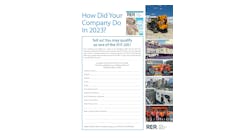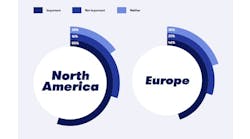Growth in key accounts was a major driving factor in United Rentals’ strong third quarter according to comments made by United Rentals’ leadership in its third-quarter conference calls from investors last week. CEO Michael Kneeland told the conference call that key accounts made up 53 percent of rental revenue in the quarter, a 23-percent year-over-year jump on a dollar basis.
“National accounts, which are a subset of key accounts, also grew 23 percent,” Kneeland said. “National accounts were 34.4 percent of rental revenue in the quarter. Now you compare that to four years ago when rental revenue from national accounts was just 19.6 percent for the same period.”
Kneeland added that what the company considers a key account, whether it is national or strategic, which is multistate but not multiregional, is the critical growth area. “Someone who’s, say, in the five boroughs of New York and doesn’t have reason to go anywhere else but is getting the lion’s share of that business and that market, that’s how we look at the world,” said Kneeland. “That’s how we’re measuring ourselves. Today, we’re around 53 percent and I see that trending up closer to 60 percent over time. That is very different than the way we looked at the world three, four or five years ago. We kicked off Operation United in 2009 to focus in on these key accounts.”
Kneeland added that another reason for United Rentals’ increase is taking market share from smaller rental outfits that make up the bulk of the rental industry. “The recession left many of these companies starved for capital, with downsized fleets and fewer service capabilities, and we compete very effectively against that,” Kneeland added. “Then there’s the secular penetration, meaning companies of all sizes are opting to rent more of their equipment they need rather than buy it.”
Demand from key accounts will play a major role in United’s framing of its capex replacement strategy for 2012, which, chief financial officer William Plummer said will likely be somewhere between $500 million and $600 million in 2012. United has yet to estimate its gross rental capex for 2012, although the company said its total for 2011 will end up about $775 million.
Based in Greenwich, Conn., United Rentals is No. 1 on the RER 100.





